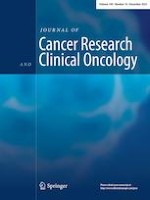Erschienen in:

12.09.2023 | Research
A novel immunogenic cell death-related genes signature for predicting prognosis, immune landscape and immunotherapy effect in hepatocellular carcinoma
verfasst von:
Guangming Xu, Yifan Jiang, Yu Li, Jiangzhen Ge, Xiaofeng Xu, Diyu Chen, Jian Wu
Erschienen in:
Journal of Cancer Research and Clinical Oncology
|
Ausgabe 18/2023
Einloggen, um Zugang zu erhalten
Abstract
Objective
Immunogenic cell death (ICD) has emerged as a promising strategy to activate the adaptive immune response, modulate the tumor microenvironment (TME) and enhance the efficacy of immune therapy. However, the relationship between ICD and TME reprogramming in hepatocellular carcinoma (HCC) remains poorly understood.
Methods
Transcriptional profiles and clinical spectrum of 486 HCC patients were obtained from TCGA and GEO databases. We utilized consensus clustering analysis to construct two distinct molecular subtypes and established an ICD-based scoring system (named ICD score) via WGCNA and LASSO Cox regression to predict the prognosis of the HCC cohort. Then we employed CIBERSORT and ESTIMATE methods to analyze the immune landscape of ICD score in HCC. Subsequently, the immunophenoscore (IPS) and tumor immune dysfunction and rejection (TIDE) analyses were performed to determine whether the ICD score could influence the immune therapeutic effect. Based on the ICD scoring system, a novel nomogram was generated to provide a numerical probability of HCC patients’ overall survival (OS).
Results
We identified two independent ICD clusters (cluster A/B), and cluster B possessed a worse prognosis and higher immune cell infiltration. Using ICD scoring system, the HCC patients were divided into high- and low-ICD-score groups. Through integrative analyses, the high-ICD cohort owned advanced TNM stage, high pathologic grade and increased suppressive immune cell enrichment. We developed a nomogram containing the ICD score, demonstrating a high predictive accuracy with a C-index of 0.703. We further discovered that PSMD2 and PSMD14 could serve as ICD-associated prognostic biomarkers and therapeutic targets in HCC.
Conclusion
The ICD score exhibits a high degree of reliability for predicting prognosis and may provide valuable guidance for the selection of immunotherapy for HCC patients. This novel scoring system enables the estimation of clinical immunotherapy response for HCC patients, offering new opportunities for personalized immunotherapy.











